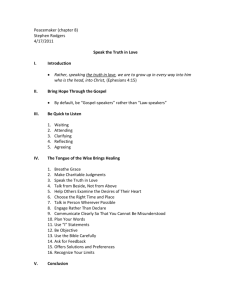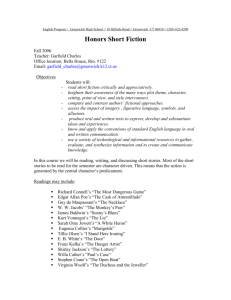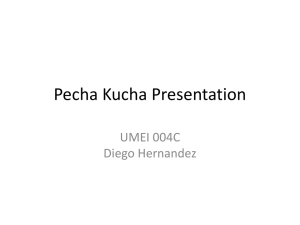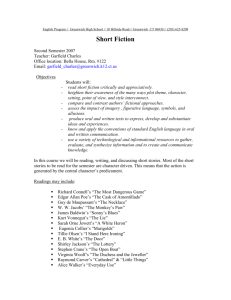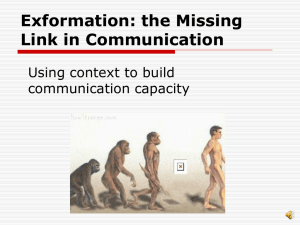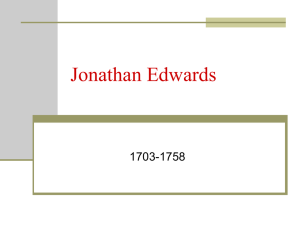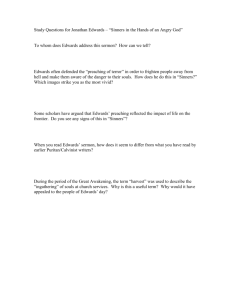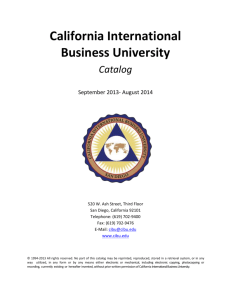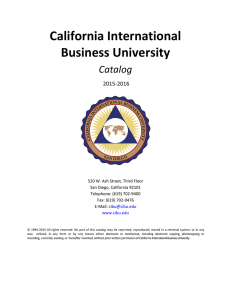COURSE SYLLABUS CIBU 694 – Business English Spring, 2010 5
advertisement
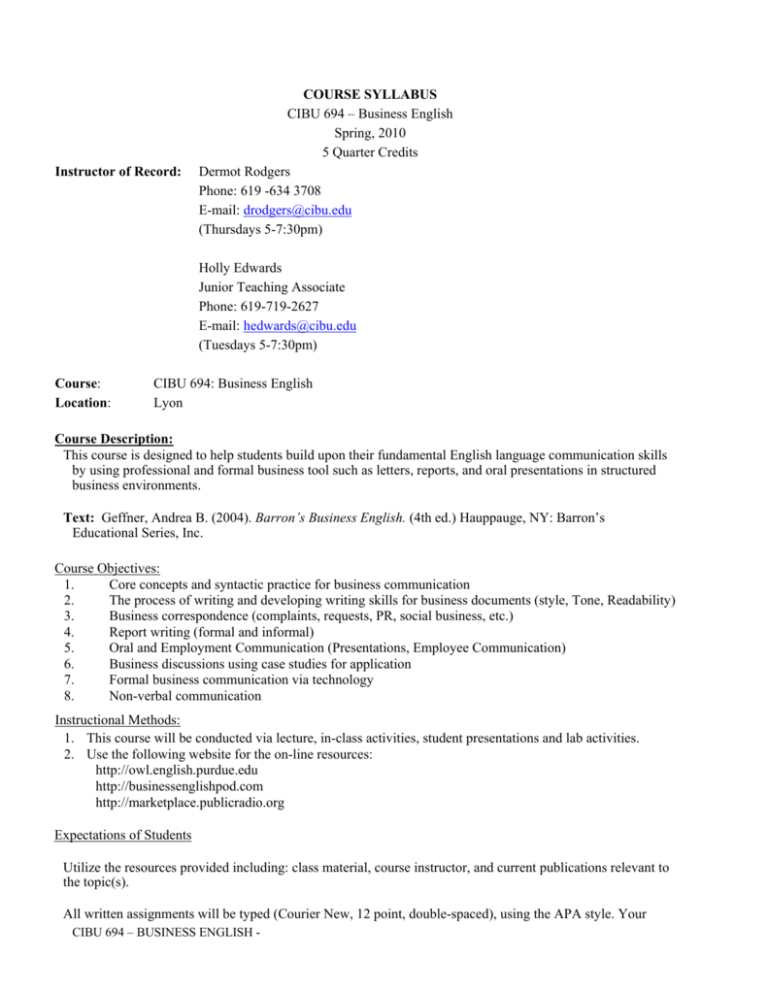
Instructor of Record: COURSE SYLLABUS CIBU 694 – Business English Spring, 2010 5 Quarter Credits Dermot Rodgers Phone: 619 -634 3708 E-mail: drodgers@cibu.edu (Thursdays 5-7:30pm) Holly Edwards Junior Teaching Associate Phone: 619-719-2627 E-mail: hedwards@cibu.edu (Tuesdays 5-7:30pm) Course: Location: CIBU 694: Business English Lyon Course Description: This course is designed to help students build upon their fundamental English language communication skills by using professional and formal business tool such as letters, reports, and oral presentations in structured business environments. Text: Geffner, Andrea B. (2004). Barron’s Business English. (4th ed.) Hauppauge, NY: Barron’s Educational Series, Inc. Course Objectives: 1. Core concepts and syntactic practice for business communication 2. The process of writing and developing writing skills for business documents (style, Tone, Readability) 3. Business correspondence (complaints, requests, PR, social business, etc.) 4. Report writing (formal and informal) 5. Oral and Employment Communication (Presentations, Employee Communication) 6. Business discussions using case studies for application 7. Formal business communication via technology 8. Non-verbal communication Instructional Methods: 1. This course will be conducted via lecture, in-class activities, student presentations and lab activities. 2. Use the following website for the on-line resources: http://owl.english.purdue.edu http://businessenglishpod.com http://marketplace.publicradio.org Expectations of Students Utilize the resources provided including: class material, course instructor, and current publications relevant to the topic(s). All written assignments will be typed (Courier New, 12 point, double-spaced), using the APA style. Your CIBU 694 – BUSINESS ENGLISH - papers should present relevant points in a clear, well-organized manner. Your work should be free from spelling and grammatical errors. Assignments are to be turned in on time. Oral assignments (presentations) should be presented in a clear and concise manner, be relevant, and have effective visual aids. Good eye contact, appropriate gestures, audible and modulated delivery is important. Business attire should be worn for presentations unless otherwise specified. Academic and Professional Conduct Ensuring academic integrity is an educational objective taken very seriously. The school's academic policy is printed in the catalog, and the following explanations may be helpful in interpreting what are considered to be violations of the policy. Students have a responsibility to maintain both the academic and professional integrity of the School and to meet the highest standards of academic and professional conduct. Students are expected to do their own work on examinations, class preparation and assignments and to conduct themselves professionally when interacting with fellow students, faculty and staff. Students must also make equitable contributions to both the quality and quantity of work performed on group projects. Academic and/or professional misconduct is subject to disciplinary action including course failure, probation or dismissal. Academic dishonesty includes, but is not limited to, cheating on examinations, plagiarism, bribery, and falsification of student records and improper attempts to influence instructors or school officials. Academic honesty is highly valued at CIBU. You must always submit work that represents your original words or ideas. If any words or ideas used in a class posting or assignment submission do not represent your original words or ideas, you must cite all relevant sources (using the APA style) and make clear the extent to which such sources were used. Words or ideas that require citation include, but are not limited to, all hard copy or electronic publications, whether copyrighted or not, and all verbal or visual communication when the content of such communication clearly originates from an identifiable source. Please see the CIBU Catalog for more information about academic honesty, including the consequences of academic dishonesty. Attendance and Participation Participation includes: • Signing your name on the attendance sheet; • Being on time to class and returning from breaks; • Sharing experiences; • Describing how you have applied the recent course concepts to your personal/professional life; • Sharing another resource you have used as you explored the course topics; • Providing relevant input to in-class discussions and complete participation in the in-class activities; • Participating equitable on team projects; • Submitting your individual assignment(s) when they are due. Work handed in beyond the deadline will be deducted 10% per day. • Students are required to observe the specific guidelines of each faculty member. Additionally, an absence will result in a written warning from the school and there are possible visa implications with the U.S. government. Any student missing more than one class will be required to meet with the Academic Dean at CIBU for a verbal warning. A second absence may result in expulsion. CIBU 694 – BUSINESS ENGLISH - Classroom Decorum • • • • • To enhance the learning atmosphere, students are expected to dress and behave in a fashion conducive to an institution of higher learning. Cell phones are to be put on 'silence' mode and calls are not to placed or answered during class. The use of laptops and other devices is to be restricted to research and study pertinent to the current class This class is expected to be interactive, however, CIBU policy requires that ALL conversations be conducted in English in the classrooms. Likewise, out of respect to classmates and instructors, leaving the classroom for any nonemergency should be limited to scheduled break times. Attendance Policy Students are required to attend all class sessions and events, and to observe the specific guidelines of each faculty member. This includes mid-term and final examinations, and other important events in each class schedule. Any absence from a class in the 10-week quarter will affect your course grade as per the syllabus. Additionally, unexcused absences will result in a written warning from the Academic Administration. Any student missing 2 classes will be required to meet with the Dean of Academic Programs. In addition to the negative impact on the course grade, potential academic probation and visa implications with the US government, unexcused absences may result in expulsion. Feedback: The instructor will return written assignments with feedback to students. Grading Standards A = Clearly stands out as an excellent performance. Has unusually sharp insight into material and initiates thoughtful questions. Sees many sides of an issue, articulates well, and writes logically and clearly. Integrates ideas previously learned from this and other disciplines; anticipates next steps in the progression of ideas. B = Grasps subject matter at a level considered to be very good. Is an active listener and participates in the workshop discussions. Speaks and writes well. Accomplishes more than the minimum requirements. Work in and out of workshop is of a high quality. C = Demonstrates a satisfactory comprehension of the subject matter. Accomplishes only the minimum requirements, and displays little or no initiative. Communicates orally and in writing at an acceptable level for a college student. Has generally acceptable understanding of all basic concepts. D = Quality and quantity of work in and out of the class is below average and barely acceptable. F = Quality and quantity of work in and out other class is unacceptable. Grading Scale: Letter Grade A AB+ B BC+ C Description/Quality Points 95-100 Excellent 90-94 87-89 83-86 Good 80-82 77-79 73-76 4.0 3.7 3.3 3.0 2.7 2.3 2.0 CIBU 694 – BUSINESS ENGLISH - CD+ D DF 70-72 67-69 63-66 Poor 60-62 Failure 1.7 1.3 1.0 .7 0.0 Quizzes: (4 points each) • Chapters 1 & 2 • Chapters 3 & 4 • Chapter 5 • Chapters 6 & 7 • Chapter 8 20 points Letters: (4 points each) • Application • Request • Response • Complaint • Sympathy 20 points Resume Presentation (PECHA KUCHA midterm) Response/Essay In-Class Teamwork Portfolio Final Total Possible CIBU 694 – BUSINESS ENGLISH - 5 points 20 points 5 points 10 points 5 points 15 points 100 points Week 1 2 3 Date Class 1 March 23 Rodgers Topic Introductions, Class expectations, Review syllabus, tour Learning Resource Center (LRC), APA style and format for homework assignments, portfolio building Class 2 March 25 Edwards • Overview/Review of Chapters 1&2 • Listening: Podcast (BEP 149 & 150 ADV) Parts 1 & 2 • The Resume (pp 253-260) Class 3 March 30 Edwards • Chapter 3- Sentence, Fragments, Run-ons • Chapter 4- Subject-Verb Agreement • Chapter 9- Business Style (pp 157-165 ONLY) • Letters of Reference (pp 266267) Class 4 April 1 Rodgers • Continue Chapter 9 Class 5 April 6 Edwards Chapter 5- Verb Forms Chapter 10- Letter Format (pp 173-184) Listening: Customer Service: Handling Complaints (BEP 53 & 54 ADV) Class 6 April 8 Rodgers Chapter 11- Request Letters (pp 187-192) Chapter 12- Replies (pp 193209) Research for details, setting up appointments, interviewing for information. CIBU 694 – BUSINESS ENGLISH - Activities/Assignments/Tests 1. Tour of library and resources 2. Proper APA format review and exercise. 3. Resume review. Bring a printed copy of current resume to class! In class review of resumes. 4. Work in pairs to write Letters of Application (pp 260-265) 5. HW: Edit and perfect Letters of Application 1. Chapters 1 & 2 exercises. Quiz to follow. 2. Listening to Podcast regarding the Multicultural Workplace (businessenglishpod.com) 3. Covering the Resume (pp 253-260). 4. HW: Refine existing resume or create new resume. Write a summary of what was changed or unchanged and why. *Note the resumes might be different depending on your experience. 1. Peer Evaluation: Resume. 2. In-class pair work: Interview your partner and start a Letter of Reference and a Letter of Recommendation (pp 266-267) 3. Chapter 3, 4. Quiz to follow. 4. Business style—writing for correct tone and to avoid repetition. 5. HW: Listen to Marketplace Morning Report for today, March 30th (marketplace.publicradio.org). Write a 300-word response to the news in the podcast. 1. Business style application (pp 165-171) 2. Individual Presentation of Marketplace Morning Report response. Visual aides a plus. Notes only. 3. Peer review and critique of written responses. 1. Chapter 5. Quiz to follow 2. Discuss proper letter format (pp 173-184) 3. In-class: Practice on p 185. 4. Listen to Podcast re: complaints (businessenglispod.com) 5. HW: Write a Request Letter to me to obtain information about CIBU 1. Turn in HW (Request Letter) 2. Chapter 12- Replies 3. Setting up appts. with CIBU staff to gain information about CIBU. Researching CIBU website to obtain information. 4. HW: Write a response from yourself to answer the questions in the Request Letters from students. 4 Class 7 April 13 Edwards Class 8 April 15 Rodgers 5 Class 9 April 20 Edwards Class 10 April 22 Rodgers 6 7 8 Class 11 April 27 Edwards Class 12 April 29 Rodgers Class 13 May 4 Edwards Class 14 May 6 Rodgers Class 15 May 11 Edwards Class 16 May 13 Rodgers Listening: BEP 59, 60, 62 ADV (businessenglishpod.com) 1. Turn in Repsonse Letter. 2. Listen to/discuss three podcasts regarding presentations. 3. Reading charts and graphs for correct information (RE:World population) Charts & Graph reading Field Study project information 1. Preparing for Field Study activities and projects. 2. View PECHA KUCHA samples from youtube.com PECHA KUCHA Introduction 3. Remind students to meet (time and place TBA) instead of 5 p.m. Field study activities 1. Spring San Diego national College fair (http://www.nacacnet.org/EventsTrainin/CollegeFa irs/ncf/Spring/Pages/SanDiegoNCF.aspx#general) 2. PECHA KUCHA night (http://www.pechakucha.org/cities/sandiego) 1. Recap of field study events. Discussion/Analysis of Field Study 2. In-class activities preparing for presentations and team projects (College Fair Pecha Kucha. Crisis communication, College Fair—long report)/ Mid-term preparation 1. Presentations—PECHA KUCHA style. (Video Mid-term recording) Feedback on mid-term presentations 1. Peer evaluation of video recorded presentations. Chapter 6- Pronouns 1. Cover Chapters 6 & 7. Quiz to follow. 2. Chapter 14 (pp 223-232). 3. Investigate and discuss pissedconsumer.com, cnet.com, sandiego.bbb.org, yelp.com 4. HW: Write a Complaint Letter to turn in on Thursday Chapter 7- Advanced Sentence Structure Chapter 14-Complaints, Claims and Adjustments Cultural Approaches to Customer Service and Relations Chapter 8- Mechanics Chapter 16- Social Business Letters Chapter 15- Sales and PR Letters Verbal and non-verbal communication CIBU 694 – BUSINESS ENGLISH - 1. Turn in Complaint Letter 2. Discuss different cultural approaches to customer service and relations. 1. Cover Chapter 8. Quiz to follow 2. Discuss social business letters for different situations. 3. HW: Write a Letter of Sympathy to Jane Doe. 1. Cover Chapter 15. 2. Verbal and non-verbal communication 9 10 Class 17 May 18 Edwards Chapter 19- News Releases Class 18 May 20 Rodgers Class 19 May 25 Edwards Class 20 May 27 Rodgers Chapter 20- Business Reports Technological Correspondence Technological Correspondence Final Exam Review Presentation Preparation Comprehensive Final Exam CIBU 694 – BUSINESS ENGLISH - Team Teaching with Mr. Rodgers 1. Cover Chapter 19-News Releases 2. Communication in the 21st Century via e-mail and/or internet messenger. Team Teaching with Ms. Edwards 1. Cover Chapter 20-Business Reports 2. Report via Skype. 1. Review 2. Final preparations for portfolio 1. In-class test 2. Portfolio presentation
